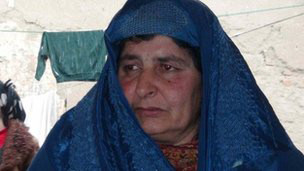By Graham Bowley
KABUL, Afghanistan — The young Afghan woman gave birth to a third girl three months ago — to a husband, the authorities say, who had been demanding a boy.
Last week, the man and his mother, in the northern Afghan province of Kunduz, put a rope around the woman’s neck and strangled her, the police said.
The body of the woman, known only as Storai, 22, was found by the police a few hours later in her room, and she was buried a day later, on Jan. 26.
Storai’s death was a chilling reminder of the low status of women in Afghanistan.
Also unsettling was the revelation that the husband, identified as Sher Mohammad, 30, was suspected of being a member of a local militia that, the police and government officials said, has proliferated in the region and stoked lawlessness and violence, including in the home.
According to the police, Storai was married four years ago, when she was 18, and had two other girls: a 3-year-old and a 2-year-old.
But in the months after the birth of Storai’s third daughter, her husband and mother-in-law nagged her and argued with her about having borne yet another girl, said Nadera Geya, head of the Directorate of Women’s Affairs in Kunduz.
After Storai’s death, in Mafali, a village in the Khanabad District in southeast Kunduz, the mother-in-law put a rope in the window of her daughter-in-law’s room to give the impression that she had killed herself, Ms. Geya said. But there were signs of torture that led to suspicions that Storai had been killed, Ms. Geya said.

Wali Hazrata is in police custody. She has made no public comment about the allegations. (Photo: BBC News)
“Her mother-in-law strangled her with a rope and said she committed suicide herself, which is not true,” she said. “They killed her because they did not want her to bear any more girls. They had disputes with her even before this.”
Sayed Sarwar Hussaini, a spokesman for the Kunduz chief of police, said that the mother-in-law, Wali Hazrata, had been arrested but that Mr. Mohammad, the husband, had fled.
Ms. Hazrata is in police custody in the city of Kunduz. She has denied that she and her son killed Storai or that her son was a member of one of the militias known as arbakai, the police spokesman said.
Kunduz is no stranger to domestic violence. In December, four gunmen, also believed to be arbakai members, broke into a house and threw acid on three school-age girls and their mother in revenge after an attacker’s offer of marriage to one of the girls, 18, was rejected by her father.
Manizha Naderi, executive director of Women for Afghan Women, which runs shelters for abused women, said that while she had seen cases in which women were bullied by their husbands through pregnancy, and that sometimes a husband even took a second or third wife if the first wife continued to have girls, murder was unusual.
“Girls are looked down upon in Afghanistan,” Ms. Naderi said. “I have heard of many cases where the wife is threatened with violence and beaten up, but I have never heard of a woman being killed for having a girl.”
Heather Barr, an Afghanistan researcher for Human Rights Watch, said that there was a cultural tolerance for violence against women and impunity for men who committed it, and that recent efforts to protect women had had scant effect.
“What is most disappointing,” Ms. Barr said, “is that the 2009 Elimination of Violence Against Women Law was supposed to change this, and it has had very little impact so far.”
She said rules in the penal code specified that a husband could kill his wife for having had sex outside of marriage. Even the civil code has rules allowing a husband to take a second wife if the first one is not procreating satisfactorily, Ms. Barr said.
The police said that Sher Mohammad was now being protected in Khanabad by a local arbakai commander called Qaderak.
Groups of irregular gunmen have proliferated in northern Afghanistan in the past two years. They work locally, sometimes protecting their neighborhoods and villages, but they often terrorize residents, extorting money and goods.
Kunduz has had a particular problem with these militias.
Only a small percentage of the militiamen were in a program run by American Special Forces to train them as neighborhood watchmen for their communities — a program that the coalition says is being wound down and transferred to full Afghan authority. The others often receive weapons and some financial support from the government as a buffer against Taliban insurgents.
The arbakai are suspected of being responsible for other killings, as well as kidnappings and thefts, in Kunduz Province, said Shah Zaman Waziri, the commander of the Second Brigade of the National Army in Kunduz. There are about 3,000 such militiamen in the province, but their numbers are decreasing, he said.
The Khanabad police said there were about 1,000 militiamen in the Khanabad District alone.
In other recent cases of brutality against women, three girls were killed this year in the Imam Sahib District by prospective husbands after the girls’ families would not allow them to marry, said Ms. Geya of the women’s affairs directorate in Kunduz.
She said that in two other cases this year, two women were killed by their husbands.
Jawad Sukhanyar contributed reporting from Kabul, and an Afghan employee of The New York Times from Kunduz, Afghanistan.



